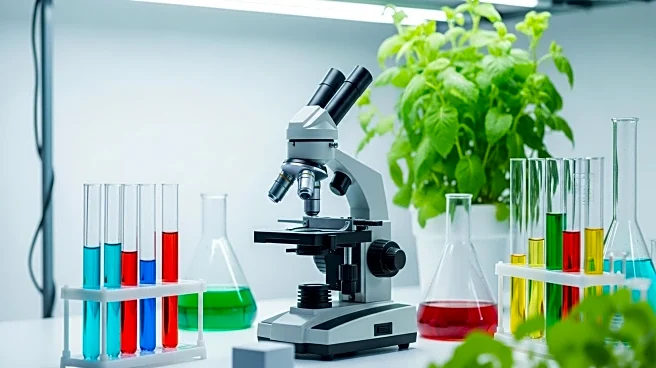What is the story about?
What's Happening?
The global market for natural synthetic cytokinin, specifically anti-zeatin riboside, is poised for significant growth, with projections indicating an increase from USD 143.7 million in 2025 to USD 324.9 million by 2035. This growth is driven by the compound's increasing adoption in agriculture, biotechnology, and horticulture, where it aids in plant growth, stress tolerance, and crop yield maximization. The market has shown consistent year-over-year growth, rising from USD 95.6 million in 2021 to USD 132.4 million in 2025. The demand is further fueled by the agriculture sector's need to address climate variability and food security challenges. Additionally, biotechnology research and plant tissue culture are significant contributors to this demand, with high-purity cytokinin compounds being essential in laboratories and research institutions.
Why It's Important?
The expansion of the natural synthetic cytokinin market is crucial for several sectors, particularly agriculture and biotechnology. As the agriculture industry faces increasing pressure to produce more resilient and higher-yielding crops amidst climate change, cytokinin compounds offer a viable solution. This growth also supports sustainable farming practices by reducing the reliance on pesticides and enhancing crop resilience. The biotechnology sector benefits from these compounds in research and development, particularly in plant biology and tissue culture, which are essential for advancing agricultural technologies. The market's growth also indicates a broader trend towards sustainable and eco-friendly agricultural inputs, aligning with global efforts to address environmental concerns.
What's Next?
The market is expected to continue its upward trajectory, with significant growth anticipated in regions like China and India, driven by government support and investment in agricultural biotechnology. In the United States, the use of cytokinin is expanding in both large-scale and organic farming, emphasizing genetically modified and climate-resilient crops. Innovations in synthetic biology and specialized formulations are likely to enhance the effectiveness and adaptability of cytokinin compounds, making them suitable for diverse agricultural environments. The competitive landscape will see established leaders and emerging innovators vying for market share, with a focus on cost-effective and efficient production technologies.
Beyond the Headlines
The growth of the cytokinin market highlights the increasing importance of biostimulants in sustainable agriculture. As regulatory frameworks evolve to support eco-friendly farming practices, the market may face challenges related to production costs and synthesis complexities. However, advancements in production technologies and regulatory compliance could mitigate these challenges. The market's expansion also underscores the potential for biotechnology to drive agricultural innovation, offering solutions to global food security and environmental sustainability issues.
















